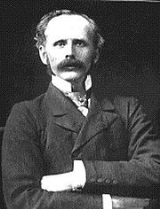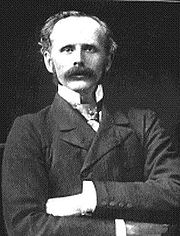
Henry Drummond
Encyclopedia

Scotland
Scotland is a country that is part of the United Kingdom. Occupying the northern third of the island of Great Britain, it shares a border with England to the south and is bounded by the North Sea to the east, the Atlantic Ocean to the north and west, and the North Channel and Irish Sea to the...
evangelist
Evangelism
Evangelism refers to the practice of relaying information about a particular set of beliefs to others who do not hold those beliefs. The term is often used in reference to Christianity....
, writer and lecturer.
Life and work
Drummond was born in StirlingStirling
Stirling is a city and former ancient burgh in Scotland, and is at the heart of the wider Stirling council area. The city is clustered around a large fortress and medieval old-town beside the River Forth...
. He was educated at Edinburgh University, where he displayed a strong inclination for physical and mathematical science. The religious element was an even more powerful factor in his nature, and disposed him to enter the Free Church of Scotland
Free Church of Scotland (1843-1900)
The Free Church of Scotland is a Scottish denomination which was formed in 1843 by a large withdrawal from the established Church of Scotland in a schism known as the "Disruption of 1843"...
. While preparing for the ministry, he became for a time deeply interested in the evangelizing mission of Moody and Sankey, in which he actively co-operated for two years.
In 1877 he became lecturer on natural science in the Free Church College
Free Church College
The Free Church College is a theological seminary in Edinburgh connected to the Free Church of Scotland. It traces its origins back to the foundation of New College, Edinburgh at the time of the Disruption of 1843...
, which enabled him to combine all the pursuits for which he felt a vocation. His studies resulted in his writing Natural Law in the Spiritual World, the argument of which is that the scientific principle of continuity extends from the physical world to the spiritual. Before the book was published in 1883, an invitation from the African Lakes Company drew Drummond away to Central Africa
Africa
Africa is the world's second largest and second most populous continent, after Asia. At about 30.2 million km² including adjacent islands, it covers 6% of the Earth's total surface area and 20.4% of the total land area...
.
Upon his return in the following year he found himself famous. Large bodies of serious readers, among the religious and the scientific classes alike, discovered in Natural Law the common standing-ground which they needed; and the universality of the demand proved, if nothing more, the seasonableness of its publication. Drummond continued to be actively interested in missionary and other movements among the Free Church students.
In 1888 he published Tropical Africa, a valuable digest of information. In 1890 he travelled in Australia
Australia
Australia , officially the Commonwealth of Australia, is a country in the Southern Hemisphere comprising the mainland of the Australian continent, the island of Tasmania, and numerous smaller islands in the Indian and Pacific Oceans. It is the world's sixth-largest country by total area...
, and in 1893 delivered the Lowell Lectures at Boston
Boston
Boston is the capital of and largest city in Massachusetts, and is one of the oldest cities in the United States. The largest city in New England, Boston is regarded as the unofficial "Capital of New England" for its economic and cultural impact on the entire New England region. The city proper had...
. It had been his intention to reserve them for mature revision, but an attempted piracy compelled him to hasten their publication, and they appeared in 1894 under the title of The Ascent of Man. Their object was to vindicate for altruism
Altruism
Altruism is a concern for the welfare of others. It is a traditional virtue in many cultures, and a core aspect of various religious traditions, though the concept of 'others' toward whom concern should be directed can vary among cultures and religions. Altruism is the opposite of...
, or the disinterested care and compassion of animals for each other, an important part in effecting the survival of the fittest
Survival of the fittest
"Survival of the fittest" is a phrase originating in evolutionary theory, as an alternative description of Natural selection. The phrase is today commonly used in contexts that are incompatible with the original meaning as intended by its first two proponents: British polymath philosopher Herbert...
, a thesis previously maintained by Professor John Fiske.
Drummond's health failed shortly afterwards (he had suffered from bone cancer for some years), and he died on 11 March 1897. His character was full of charm. His writings were too nicely adapted to the needs of his own day to justify the expectation that they would long survive it, but few men exercised more religious influence in their own generation, especially on young men.
Selected writings

- Natural Law in the Spiritual World (1883)
- Tropical Africa (1888)
- The Greatest Thing in the World and Other Addresses (1894)
- The Ascent of Man (1894)
- The Ideal Life and Other Unpublished Addresses (1897)
- The Monkey That Would Not Kill (1898)
- The New Evangelism and Other Papers (1899)
For Further Reading
- Simpson, James YJames Young Simpson (scientist)James Young Simpson , M.A., D.Sc. , F.R.S.E, F.S.A. , F.R.A.I., Hon. Jur. D. , Hon. Sc.D. Middlebury College, U.S.A. He was a Professor of Natural Science, writer, diplomat, biographer and theologian.- Life :...
. Henry Drummond. Edinburgh: Oliphant, Anderson and FerrierOliphant, Anderson and FerrierThis Edinburgh book publishing firm produced many hundreds of books mainly on religious and biographical themes, especially during its heyday from about 1880 to 1910. It is probably best remembered for its memorable ‘Famous Scots Series’ with their distinctive red and gilt covers. Forty-two of...
, 1901, ("Famous Scots Series") - Drummond, Henry (1894). Natural Law in the Spiritual World. Hodder and Stoughton (reissued by Cambridge University PressCambridge University PressCambridge University Press is the publishing business of the University of Cambridge. Granted letters patent by Henry VIII in 1534, it is the world's oldest publishing house, and the second largest university press in the world...
, 2009; ISBN 978-1-108-00013-0) - Drummond, Henry (1883). The Ascent of Man. J. Pott & Co. (reissued by Cambridge University PressCambridge University PressCambridge University Press is the publishing business of the University of Cambridge. Granted letters patent by Henry VIII in 1534, it is the world's oldest publishing house, and the second largest university press in the world...
, 2009; ISBN 978-1-108-00053-6)
External links
- Works by Henry Drummond at archive.org
- The Monkey Who Would Not Kill with full text and full page images from the Baldwin Library of Historical Children's LiteratureUniversity of Florida Baldwin LibraryThe Baldwin Library of Historical Children's Literature in the Department of Special and Area Studies Collections at the University of Florida's George A. Smathers Libraries contains more than 103,000 volumes published in Great Britain and the United States from the early 18th century through the...
- Evangelicalism in Transition: A Comparative Analysis of the Work and Theology of D.L. Moody and His Proteges, Henry Drummond and R.A. Torrey, a Doctoral Dissertation by Mark James Toone, presented to the Faculty of St. Mary's College, University of St. Andrews, 1988

